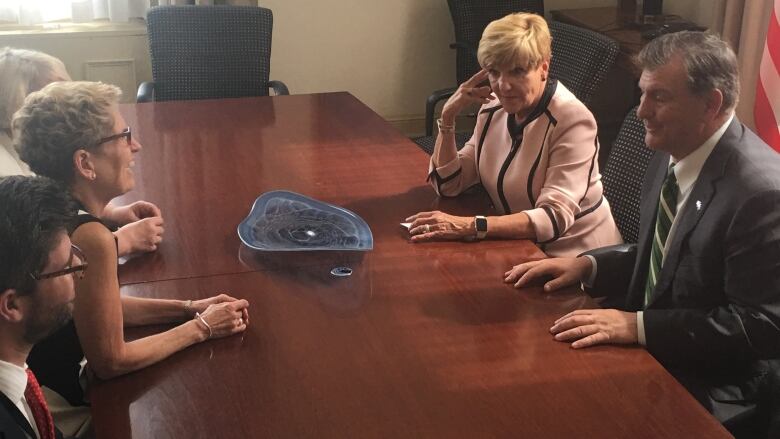Texas mayors back Canada's efforts to block Buy America policies
New state legislation could hurt Canada's $14B steel industry

A pair of Texas mayors is joining Canada's fightto try to convince the state's top lawmakers to reverse course on a new "Buy America"law that couldhurt Canada's steel and iron industries.
Mayor Mike Rawlings of Dallas and Mayor Betsy Price of Fort Worth were in Toronto and Montreal this week on a trade mission, and they made it clear they are no fans of the bill that was signed into law by Gov. Greg Abbott last Friday.
We are going down a path that is very dangerous.- Dallas Mayor MikeRawlings
"When legislation like this happens, we are going down a path that is very dangerous," Rawlings told reporters after meeting with Ontario Premier Kathleen Wynne.
The law requires that only American iron and steel be bought for large state infrastructure projects, including the construction of buildings, bridges and highways.
Texas is the lateststate to pursue a Buy America policy, following the example set by U.S. President Donald Trump since he came into office. New York considered the policyin its recent budget but dropped it at the last minute, much to the relief ofWynne, whose government lobbied hard against it. Illinois is also considering it.
Trade keeping pace w/ the way we do business the focus of my warm meeting w/ Mayor @Mike_Rawlings & @MayorBetsyPrice https://t.co/GtizCD7mrr
—@Kathleen_WynneThere are some exceptions to Texas's law, but effectively companies in Canada's $14-billion steel industry (mostly based in Ontario, Alberta and Quebec) could largely be shut out of bidding on projects once the law goes into force on September 1.
Texas is the second biggest state by population and by geography, making it an important place for Canadian provinces to do business south of the border.Ontario alone traded more than $16 billion worth of goods with the Lone Star State last year.
The Texas mayors are worried about the impact to their state's economy, too, if key players in Canada can't get access.
'Canadian friends concerned'
That's why governments at Canada's federal and provincial levels are fighting against protectionist measures, and why Rawlings and Price are on the same page.
Rawlings, who has led Dallas since 2011, said they have to tell the story of how important the U.S.-Canada trade relationship is and how "anything that blocks that ... is detrimental."
- Canada, U.S. remain 'quite far apart' on softwood lumber,Freelandsays
- 'MakingStelcogreat again': Hamilton steel company changes its name back
The mayors said the state'sBuy America bill was rushed through without enough consideration to the impact on the cross-border steel trade. Countries like China, not Canada, were the intended target, they said;nonetheless, exemptions sought by Ontario and Alberta were not granted.
"We will continue to work with our state folks to see if we can't do better,"Price said, pledging that she andRawlingswillcommunicate the message to the governorand others that "our Canadian friends are very concerned, as are we."
A special legislative session is set for July 18, and they want the law to be revisited and modified then.Even though they are local mayors, Price andRawlingsrepresent more than seven million Texansand are "really involved" with what goes on at the state legislature in Austin,Rawlingssaid.

After meeting with them, Ontario's Minister of International TradeMichael Chantold CBC News that he's encouraged by their commitment to fighting the law.
"Dallas and Fort Worth are important drivers of Texas's economy, and I'm pleased that they will bring our same message to state lawmakers as we have,"Chan said in an email. "Over the summer monthswe will work with our counterparts in Texas to try and achieve a solution that maintains the strength of our trading relationship."
Stop the spread of Buy America
Ontario has said it is prepared to retaliate with protectionist measures of its own if states pass laws blocking access to their markets. But while Wynne said Monday she is disappointed by Texas passing a "discriminatory"law, she's not ready to strike back.
"We are not at that point,'" Wynne told reporters. "My understanding is that there may be ways, as we move forward, to make sure that our industry here in Ontario is not unduly damaged." Ontario leads Canada's provinces in steel exports to the U.S., sending more than $4 billion worth of products south a year.
AlbertaTrade MinisterDeron Bilous said in an interviewthat it would be "fantastic" if the provinces could still get an exemption but, "I'm not holding my breath on that."

Instead, his focus is to try to ensure this Buy America policy on steel and iron doesn't spread to other sectors. That involves communicating to Texas lawmakers that blocking Canadian provinces from doing business there will make goods more expensive for their residents, said Bilous, who met with Texas's secretary of state on Wednesday in Calgary.
Bilous said they want Texans to call their lawmakers and share their concerns. "Believe me, as legislators, we listen to our constituents,"he said.
If the lobbying and public pressure don't work, however, the head of the Canadian Steel Producers Association said Wynne should follow through on her threat and impose restrictions on U.S. firms.
Joseph Galimberti saidCanada and the U.S. have a long history of fair trade in steel, and he wants it to stay that way, but itwouldn't be fair for U.S. firms to have unrestricted access to Canada's markets if Canada's companies are blocked in U.S. jurisdictions, he said.
"It's important that Canadian industry and workers be respected,"said Galimberti."And I think it's the government's job to stand up for them."












_(720p).jpg)


 OFFICIAL HD MUSIC VIDEO.jpg)
.jpg)



























































































